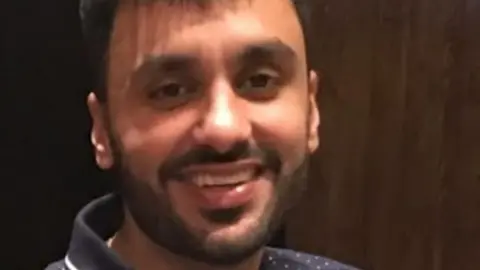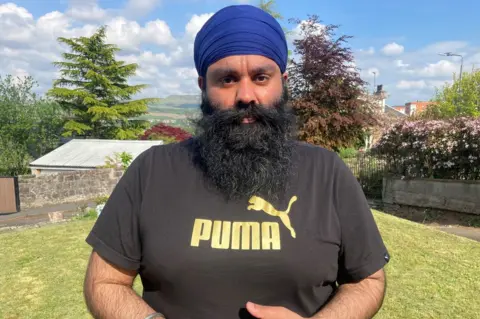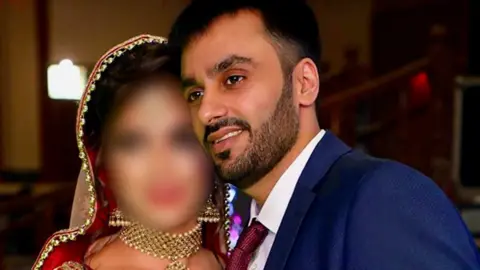Scot held in India since 2017 faces conspiracy to murder charge
 Free Jaggi Campaign
Free Jaggi CampaignA Scottish Sikh who has been detained in India for almost five years has been formally charged with conspiracy to commit murder.
Jagtar Singh Johal, 35, from Dumbarton, West Dunbartonshire, was also accused of being a member of a terrorist gang.
Reprieve said he had been imprisoned on a false confession with "no physical evidence" linking him to the charges.
The Indian government previously said Mr Johal's detention was based on "sufficient prosecutable evidence".
But in May human rights investigators at the UN said his detention had no legal basis.
Mr Johal, who was arrested in November 2017 in the Punjab region, is accused of being part of a terror plot against right wing Hindu leaders.
Reprieve said India's anti-terror law, the Unlawful Activities Prevention Act (UAPA), had been repeatedly used to target Sikh activists.
The campaign group said it obliges judges to frame charges even where they know evidence would be inadmissible or easily discredited at trial.
Dan Dolan, director of advocacy, said: "Jagtar's detention has been recognised as arbitrary by both the British prime minister and a group of UN legal experts.
"The framing of charges doesn't change that. He remains imprisoned based on a false confession he signed after days of torture with electricity.
"There is no physical evidence to support these trumped-up political charges. This is self-evidently arbitrary detention."

Mr Dolan said the judge repeatedly asked prosecutors to produce corroborating evidence but they were unable to present any, despite the fact they have had more than four years to prepare a case.
He added: "It would be farcical if it weren't for the fact that a young man's life is at stake.
"UN legal experts have made clear that Jagtar should be released immediately, so what is the government waiting for?"
'Absurd charges'
His brother Gurpreet Singh Johal also urged UK ministers to take action.
He said: "Even after they acknowledged he is arbitrarily detained, they continued to delay.
"The absurd charges framed today, built on a false torture confession, highlight the cost of that negligence.
"Now more than ever, Jagtar needs the UK government to demand his release."
A UK government spokesman said: "We consistently raise our concerns about Mr Johal's case with the government of India, including his allegations of torture and mistreatment and his right to a fair trial."
 Free Jaggi Campaign
Free Jaggi CampaignMr Johal's family said he was snatched from the street by plain-clothes officers weeks after his wedding while out shopping with his wife and had a bag placed over his head.
He has remained in detention in a series of Indian prisons ever since, accused of funding the purchase of weapons used to assassinate a number of right-wing Hindu religious and political leaders in the Punjab.
Almost five years on, Mr Johal has not stood trial in any of the cases against him and has insisted he has been "falsely implicated" in the killings.
He alleges that he was beaten, electrocuted and tortured while in the initial custody of the Punjab Police, and that he was forced to sign blank documents.
Confession video
In December 2017, a month after his arrest, Mr Johal appeared in a video from custody - broadcast on Indian TV outlets - allegedly confessing to participating in the crimes.
His family and supporters say this confession was coerced and Mr Johal had been targeted by the Indian authorities due to his Sikh faith and his online activism highlighting the historical persecution of Sikhs in the Punjab.
The Indian government denies Mr Johal has been tortured or mistreated and says there have been no human rights violations against him.
But the report by the UN Working Group's investigators directly calls that into question.
It found Mr Johal had been "interrogated repeatedly in the absence of legal counsel and in incommunicado detention" saying that any confession obtained in these conditions should not be admissible in any trial.
Investigators also concluded that Mr Johal's detention without trial was "on discriminatory grounds, owing to his status as a human rights defender and based on his political activism, religious faith and opinions," something Mr Johal's family have asserted since he was first arrested in 2017.
The Indian government said under the country's laws no discrimination was made based on religion.
